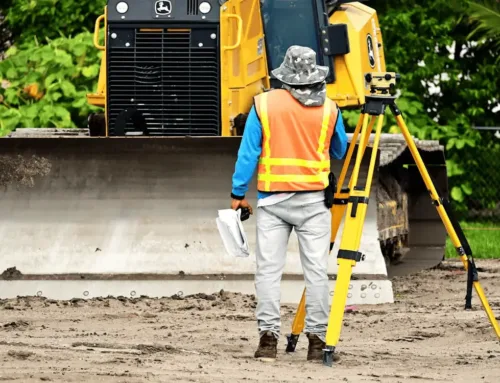Land elevation surveys are essential for property owners, architects, engineers, and insurance companies to understand the landscape’s topography, boundaries, and flood risk. These surveys provide critical information that can influence construction projects, insurance premiums, and legal disputes. In this article, we explore the nuances of land elevation surveys, including elevation certificates, their differences from traditional land surveys, and their importance in various scenarios.
Understanding Land Elevation Surveys
What is an Elevation Certificate?
An Elevation Certificate (EC) is a vital document for homeowners and developers, particularly in flood-prone areas. Prepared by a licensed land surveyor or engineer, the EC furnishes intricate details regarding your property’s elevation concerning the floodplain. This information is crucial for evaluating flood risk and is frequently necessary when securing flood insurance or adhering to local floodplain regulations.
The Elevation Certificate is your key to understanding and managing flood risk. It includes the lowest floor elevation of your building, which insurance companies use, along with other factors, to calculate rates. If you’re purchasing a home or planning substantial improvements, it’s wise to check if an existing EC is available or contact a local licensed land surveyor to obtain one.
To get an Elevation Certificate, follow these steps:
- Hire a certified professional, such as a land surveyor, engineer, or architect.
- The professional will assess your property’s elevation points and building characteristics.
- They will then prepare the EC, which you can provide to insurance agents or use for compliance with floodplain management laws.
Secure your property’s safety today with Millman National Land Services. Let us guide you through the process and ensure peace of mind for your property’s future.
Elevation Certificates vs. Land Surveys
Understanding the distinction between an elevation certificate and a land survey is crucial when dealing with property-related decisions. An elevation certificate, often prepared by a land surveyor or engineer, provides detailed information about the elevation of your property’s lowest floor relative to the floodplain. It is a key document for assessing flood risk and is typically required for flood insurance purposes.
In contrast, a land survey outlines the precise boundaries of your property, marking the limits of ownership. It may include topographical details but does not focus on the specific elevation aspects of your building. If you’re considering a land survey, it’s worth noting that the surveyor might be able to issue an elevation certificate concurrently, streamlining the process.
To obtain an elevation certificate, you should seek out a certified professional, such as a state-licensed surveyor, who has the expertise to accurately assess and document your property’s elevation details. Remember, state regulations and continuing education are crucial for these professionals to maintain their licensing and ability to perform accurate surveys.
Related: What Is a Land Survey and What are the Types of Surveys?
When You Need an Elevation Certificate vs. Property Survey
Determining whether you need an elevation certificate or a property survey depends on your specific circumstances. An elevation certificate is crucial if you’re in a high-risk flood zone and seeking flood insurance. This certificate, which assesses your property’s flood risk, is often required by insurance companies to calculate your premium rates. On the other hand, a property survey is essential when you’re buying, selling, or developing land, as it clarifies boundary lines and helps prevent disputes with neighbors.
To obtain an elevation certificate, you’ll need to hire a certified professional, such as a state-licensed surveyor, certified engineer, or architect. They will evaluate your property’s lowest elevation point and other critical details to provide the necessary documentation. Remember, this certificate can offer insights into reducing your flood risk. Conversely, a property survey is typically conducted to resolve boundary issues and is used by various stakeholders in real estate transactions.
Related: Property Line Disputes: What You Need To Know
How to Get an Elevation Certificate
Obtaining an elevation survey certificate is a straightforward process, but it requires attention to detail and the right professional assistance. First, determine if your property already has an elevation certificate by contacting your state’s floodplain manager or inquiring with the previous property owners if you’re purchasing a home.
If an elevation certificate is not available, you’ll need to hire a certified professional. This could be a state-licensed surveyor, certified engineer, or architect who is qualified to conduct elevation surveys. They will assess your home’s elevation points and compile the necessary data into an official certificate.
Here are the steps you should follow:
- Verify whether an existing elevation certificate is on file.
- Select a certified professional to perform the elevation survey.
- Schedule an appointment for the survey of your property.
- Review the completed elevation certificate for accuracy.
- Use the certificate for insurance or regulatory purposes as needed.
Remember, an elevation certificate can influence your flood insurance premiums and is crucial for compliance with local regulations. Ensure that the professional you choose is properly certified to provide an elevation certificate, as not all have the necessary training.
The Importance of Accurate Land Surveying
Flood vs. Land Surveys: What’s Included
When you’re faced with property decisions, understanding the differences between flood and land surveys is crucial. A flood survey, also known as an elevation certificate, focuses on your property’s elevation levels and flood risk. It includes the lowest elevation point, flood zone classification, and building characteristics. This information is essential for insurance purposes, especially in high-risk areas. On the other hand, a land survey delineates your property’s boundaries and may include topographical details but does not assess flood risk.
Here’s what you can typically expect from each type of survey:
- Flood Survey (Elevation Certificate):
- Lowest elevation point on the property
- Flood zone determination
- Building characteristics relevant to flood risk
- Land Survey:
- Boundary lines and total acreage
- Location of natural and artificial structures
- Rights-of-way and easements
Choosing the right survey depends on your specific needs. If you’re looking to understand your flood risk and potentially lower your insurance costs, an elevation certificate is what you need. For defining property lines or resolving boundary disputes, a land survey is appropriate. Remember, the responsibility for survey costs typically falls on the property owner, so it’s wise to factor this into your budget when planning for property improvements or transfers.
Flood Certificates vs. Land Surveys: Who Uses Them?
While you may be familiar with the concept of land surveys for establishing property boundaries, flood certificates serve a different, yet equally important purpose. Insurance companies are the primary users of flood certificates, relying on them to assess the flood risk of properties, especially those in high-risk zones. These certificates are crucial for determining insurance premiums and coverage options for homeowners.
On the other hand, a variety of professionals utilize land surveys, including:
- Architects and civil engineers for planning new developments
- Construction workers for making property improvements
- Real estate agents for parcel transactions
- Lawyers for resolving boundary disputes
- Title and mortgage companies during land transfers
As a property owner, you might need a land survey to understand your property lines and ensure you’re not encroaching on your neighbor’s land. Remember, land surveys are essential for property boundaries and changes. They do not expire but may become inaccurate with property changes. Different types serve various real estate needs and legal requirements, with surveyors typically guaranteeing accuracy for 5-10 years. When hiring professionals, you ensure both accuracy and legality, which is crucial for any property owner.
Wondering how to ensure accuracy and legality for your property? Turn to the expert team at Millman National Land Services for guidance and peace of mind.
Topographic Surveys and Their Role in Development
When you’re embarking on a development project, understanding the lay of the land is crucial. Topographic surveys are indispensable tools in this process, providing detailed information about the land’s features. These surveys map out the elevation, contours, and composition of the terrain, which are essential for planning and executing construction projects effectively.
A topographic survey’s role extends beyond mere mapping; it is the backbone of informed decision-making. Here’s how it contributes to development:
- It aids architects and engineers in designing structures that harmoniously integrate with the natural landscape.
- It helps in identifying the best use of the land, considering its topography and existing features.
- It is vital for assessing potential construction challenges, such as drainage issues or the stability of the ground.
By utilizing a topographic survey, you ensure that your development project is built on a solid foundation of knowledge, minimizing risks and paving the way for a successful build.
Related: Who Performs Alta Land Surveys?
Choosing the Right Land Surveyor for Your Project
Selecting the right land surveyor is crucial for the success of your project. You want to ensure that the professional you hire is not only licensed but also specializes in the type of survey you require. Look for a surveyor with experience in similar projects to yours, as this can greatly influence the accuracy and reliability of the survey results.
When you start your search, consider the following steps:
- Verify the surveyor’s licensing credentials.
- Ask for references and review their past work.
- Ensure they are equipped with the latest technology and methods.
- Compare quotes and check for transparency in pricing.
- Read online reviews to gauge the satisfaction of previous clients.
Remember, the cheapest option may not always be the best. Quality and precision are paramount when it comes to land surveying. By taking the time to do your research and select a reputable surveyor, you can avoid costly mistakes and ensure that your land is surveyed correctly, providing you with peace of mind and a solid foundation for your project.
Accurate land surveying is the cornerstone of successful property development and dispute resolution. At Millman National Land Services, we understand the critical role precision plays in your projects. Whether you’re a commercial real estate professional or an individual property owner, our nationwide services, adherence to ALTA standards, and commitment to excellence ensure your surveying needs are met with the utmost accuracy. Don’t leave your land surveying to chance. Visit our website today to place an order and experience the peace of mind that comes with knowing your project is in expert hands.
Crucial Land Elevation Surveys: Development, Insurance, Legal
Land elevation surveys are an indispensable tool for property owners, architects, engineers, and insurance providers. Understanding the nuances between elevation certificates and land surveys is crucial for making informed decisions about property development, insurance, and legal matters. Whether you’re safeguarding against flood risks with an elevation certificate or delineating property boundaries with a land survey, the expertise of professional surveyors is vital. As we’ve explored the various aspects and applications of these surveys, it’s clear that they serve to protect investments and ensure compliance with local regulations. For those in need of an elevation certificate or any land surveying service, seeking the assistance of experienced professionals can provide peace of mind and facilitate the successful completion of your project.
Related: How Long Is a Land Survey Good For?







